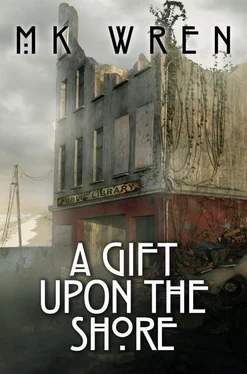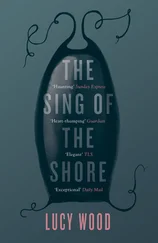He nods, grinning proudly. “The salmon run’s the best I’ve ever seen. We could’ve brought back more than the one wagonload, if we had a way to take care of them. Jeremiah says we should build a bigger smokehouse.”
Jerry and the boys were gone for two days collecting their bounty. They returned with it yesterday evening, and this morning the women and girls were busy cleaning the fish and hanging them in the smokehouse.
I remember a time when Rachel and I wondered if we’d ever see another salmon running the Coho River.
Stephen sits beside me, legs stretched out, heels digging into the sand. “Are you going to tell me more about your story, your… Chronicle?”
His interest pleases me, even if it’s still only curiosity. “Yes, of course. But most of this part still has to come out of my memory. I hadn’t begun my occasional diary yet.”
“How can you remember things that happened so long ago?”
“Sometimes—at least, at my age—things that happened long ago are more vivid than things that happened just yesterday.”
He seems to consider that, then: “What happened after Rachel found you?”
I look out at the tumbling breakers and back into memory. “Well, she went to get Jim and Connie Acres. They were her nearest neighbors. Jim brought his old brown Dodge van. He was a big man, hair like those clouds, white on top, gray on the edges. I remember when he carried me to the van, I held on to him like a frightened child, and he smelled of soap and… it seemed like sage. He reminded me of my father, and that made me cry.” Now I can smile at that memory, at Jim assuring me I was safe. He didn’t understand why I was crying, and I was too weak to explain.
Stephen prompts me. “Did you come to Amarna then?”
“Yes. When we reached the house, Jim carried me inside and put me in the bed in the spare room. Well, it’s Jeremiah’s room now, and it was mine until after Rachel died. Anyway, once I was in bed, Connie took over. She was a paramedic. A doctor of sorts.”
“What did she look like?”
The memory is poignantly clear. Constanza Jensen Acres, of mixed ancestry that combined so beautifully. “Well, she was tall and thin, Stephen, and her hair was salt-and-pepper gray. She moved like a dancer. An amazing woman. And within an hour she had me numbed with a local anesthetic and the wound cleaned, sutured, and bandaged. She plied me with antibiotics and gave me a tetanus shot. The wound wasn’t serious, but I’d lost a lot of blood. Anyway, I went to sleep, and it was a long time before I woke up enough even to know where I was. I remember lying on that narrow bed wondering what kind of hospital they had in Shiloh where the walls were wood-paneled and lined with bookshelves. Then it began to dawn on me that I wasn’t in a hospital at all when I saw the paintings on the wall across from me. They were all abstracts: amorphous forms and colors that seemed to glow. I thought I saw images in them I recognized, yet when I tried to name them, they vanished.”
Then I look down at Shadow. “I was sure I wasn’t in a hospital when I saw Shadow asleep at the foot of the bed. The first Shadow, I mean. As soon as I moved, she jumped off the bed and started barking, then Topaz appeared in the doorway, barking too. Finally, Rachel came to quiet them. She sat in a chair by the bed and answered questions for me. You know, where am I, what happened, that sort of thing.”
Stephen leans down to stroke Shadow’s head. “You knew then you’d come home, didn’t you?”
I consider his question, knowing that to him it is rhetorical. He doesn’t understand that I lived in a world of myriad alternatives, that I had another vision of home .
“No, Stephen, I only knew then that I’d found a friend. That was miracle enough.”
Nor does he understand how rare it was then, finding a friend. I wonder if he really knows what the word means. There are so few people in his world, and they’re all family, all part of his tribe.
He turns, studying me intently. “Mary, what was Rachel like? I mean, you talk about her all the time, and you showed us the pictures of her, but I don’t really know what she was like.”
I nod, pausing before I answer. “Well, the first thing you should understand about Rachel is that she was an artist. Her life centered on art. Sometimes people bought her paintings. Not many by the time I met her. Most people didn’t have the money to spare for what was considered a luxury. Yet art was one of the first expressions of our humanity, Stephen. Cro-Magnon didn’t consider it a luxury. Anyway, Rachel was fifty years old when I came to Amarna. She’d lived alone here for twenty years and never married or had children.”
“Why didn’t she have children? Was she a Barren?” Stephen doesn’t ask why she didn’t marry. That institution means little to him.
“No, she wasn’t a Barren. She chose to remain childless because at that point in our history, she considered bringing more children into the world a crime against humanity.”
His dark eyes widen. “A crime ?”
“Yes. I’ve told you about the billions of people burdening this small planet, but I know it’s impossible for you to imagine them. Rachel said that nature wouldn’t tolerate too many of anything, wouldn’t tolerate imbalance. The scales were shifting even then. She didn’t have children because she was too capable of loving them, and she’d seen the writing on the wall.”
“Like Daniel. Mene, mene, tekel, upharsin .” Then with a perplexed frown: “But what writing did Rachel see?”
“A balance will be struck. That’s what she saw.”
The breakers turn slowly like liquid green glass, crash into white froth, and I remember the seas of years past, remember watching them with Rachel. The balance was indeed struck. But waves have broken on this shore for millennia and will continue to do so for millennia to come, whatever humankind’s fate. Rachel understood that splendid indifference, and she wasn’t afraid of it.
“And yet… she hoped, Stephen. She always hoped that humankind would learn tolerance and kindness and restraint, that we wouldn’t throw away everything we’d learned and built. I think painting was her way of expressing her hope and her amazement at the world. And painting gave her sharp eyes.” Stephen smiles tentatively at that, and I add, “It trained her to see things most people missed and in ways most people wouldn’t think of. Yet she also approached the world as a scientist would, and she never considered that a paradox.”
“What do you mean, as a scientist would?”
Do I detect an edge of suspicion in spite of all my teaching? Perhaps. I’m not his only teacher.
“I mean Rachel wanted to understand the world around her as it really is. She thought it was magnificent and wanted to know about it. Of course, no one can understand everything there is to know about the world, even if everything were known. She said reality is always in the process of being defined. But she learned everything she could.”
Stephen picks up a strand of sea grass weathered to translucent fibers and absently wraps the pale ribbon around one finger, while I wait for the question he hasn’t yet decided to ask.
In time, he puts it into words. “Miriam says there are some things people can’t know. Shouldn’t know.”
No doubt she would add, some things people must take on faith.
I ask, “Do you believe there are things people shouldn’t know?”
He unfurls the ribbon of grass. “Miriam says it’s written in the Bible.”
“Maybe it is. That doesn’t answer my question.”
He looks at me, and the grass slips from his hands, snakes along the sand with the wind behind it. Perhaps it’s because we’re alone and away from Amarna—away from Miriam—that he considers the question carefully and at length answers, “I don’t see why it should be wrong for me to know anything .”
Читать дальше












